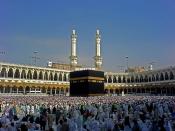The hajj, the pilgrimage to Mecca in Saudia Arabia, is the fifth Islamic obligatory act of worship. It is a once in a lifetime act for those who can afford it. It takes place during the first ten days of the twelfth month of the Muslim year. It was once a pagan rite observed by polytheistic Arabs, the Quraysh tribe, long before Islam. Islam modified the pagan rite to fit into the Islamic monotheistic faith. The pilgrimage is seen as a very important step in the Muslim community, and the pilgrim or "hajji", as they are later called, is one who is held in the utmost respect and is expected to be an example to all other Muslims. The pilgrimage to Mecca is pivotal to the religion of Islam because of its commemorative, symbolic, and business aspect.
The first reason why the pilgrimage to Mecca is such an important pillar for Muslims to complete is because of the commemorative aspect of Hajj.
Hajj commemorates events of the Prophet Ibrahim (Abraham) and his family. There is a traditional belief amongst Muslims that: ""æ in performing the Hajj they are literally re-enacting the birth of the primordial Islam of Ibrahim (Abraham), the "first monotheist", his bondswoman, Hagar, and his son Isma'il (Ishmael), ancestor of the Arabs." (Fowler, 159) The second rite of Hajj commemorates the actions of the Prophet Ibrahim's second wife, Hajrah (Hagar), when she was sent away from her family to fend for herself and her young son, Ishmael, in the desert. According to Islamic tradition, Hagar ran back and forth seven times between the two small hills 'Al-Safa' and 'Al-Marwah' in search of water or someone who could give it to her. Finding nothing, she returned to her young son, Ishmael, and found that God had revealed the...


